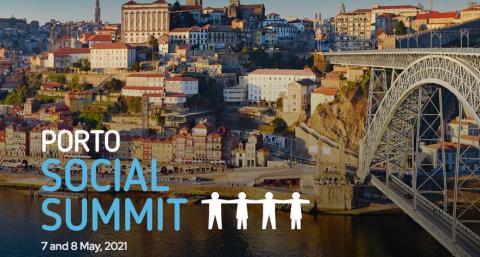European Economic
and Social Committee
EESC at the Porto Social Summit: put people at the heart of our action for economic prosperity, social inclusion and sustainability!
The European Economic and Social Committee (EESC) intends to play an active part in joint European efforts to translate the principles of the European Pillar of Social Rights (EPSR) into action and to build a fairer and more prosperous Europe for everyone.
Taking part in the High-Level Conference of the Porto Social Summit, held by the Portuguese EU presidency on 7 May, EESC representatives expressed the Committee's dedication to fostering economic and social reconstruction by putting people at the heart of policies. The EESC will work together with other EU institutions, Member States and citizens to achieve the goals set by the EPSR's Action Plan. These include boosting employment, strengthening education and reducing poverty and social exclusion.
Through our actions, we can make Europe recover, or we can be more ambitious and make it thrive! For that to happen, we should create the conditions for the EU's job-rich prosperity
, said EESC president Christa Schweng. We should also make sure that all citizens are supported and empowered with relevant skills for work and life, so they can look towards the future with confidence. You can count on our commitment to demonstrating that the EU and Member States can act together with their citizens and improve their lives, leaving nobody behind.
During her presentation she put a strong accent on the need to equip all people – regardless of their employment status or age – with the right skills to allow them to be active citizens, prepare them for the changes in the world of work and avoid mismatches that ultimately hamper the EU's economic growth and competitiveness.
The Committee has adopted a resolution ahead of the Summit. In the document, the EESC calls on all stakeholders to put equal weight on the economic, social and environmental dimensions when building a sustainable future.
The EESC president and the presidents of the EESC's three groups – representing Europe's employers, workers and civil society organisations defending various interests – took part in the Summit's working sessions clustered around topics related to the proposed goals of the Action Plan: 1) work and employment, 2) skills and innovation, and 3) welfare state and social protection.
The Employers' Group president Stefano Mallia said: As the vaccine rollout shifts into high gear, Europe needs to get back on its feet. The most urgent economic and social challenge in Europe is to reduce unemployment, particularly among young people. All our energy must be focused on creating sustainable future-proof jobs and equipping people with the skills that they need to thrive in the green and digital transitions. National education and training systems should be rapidly modernised to anticipate and deliver skills and competences relevant for current and future labour market needs.
The Workers' Group president Oliver Röpke said: For years, the trade union movement and other civil society actors have warned about the need to tackle precarious work. But without the political will and a new social and economic model that fosters the right conditions for quality job creation, the best labour market policies will never be enough. Let us use the new momentum provided by the COVID-19 pandemic as a catalyst for the radical changes we need to guarantee fairer and more resilient societies with a sustainable economic model and with people's well-being at the centre.
The Diversity Europe Group president Séamus Boland said: Accomplishing the objectives of the Action Plan will only be possible with bottom-up initiatives that identify solutions and tackle societal challenges, involving all people, particularly the most vulnerable and marginalised, who are all too often not heard. Finally, the Pillar needs to take sufficient account of the medium to longer term impact of the COVID-19 crisis on European health systems. One thing is certain: the Social Pillar has come at the best possible time for the EU. Citizens are demanding a more social Europe. It is time for EU leaders to jointly act upon those wishes.
